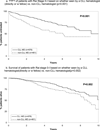Hematologist/oncologist disease-specific expertise and survival: lessons from chronic lymphocytic leukemia (CLL)/small lymphocytic lymphoma (SLL)
- PMID: 22009554
- PMCID: PMC3893049
- DOI: 10.1002/cncr.26474
Hematologist/oncologist disease-specific expertise and survival: lessons from chronic lymphocytic leukemia (CLL)/small lymphocytic lymphoma (SLL)
Abstract
Background: The impact of physicians' disease-specific expertise on patient outcome is unknown. Although previous studies suggest a survival advantage for cancer patients cared for at high-volume centers, these observations may simply reflect referral bias or better access to advanced technologies, clinical trials, and multidisciplinary support at large centers.
Methods: We evaluated time to first treatment (TTFT) and overall survival (OS) of patients with newly diagnosed chronic lymphocytic leukemia/small lymphocytic lymphoma (CLL) at a single academic center based on whether they were cared for by a hematologist/oncologist who subspecializes in CLL (CLL hematologist) or a hematologist/oncologist with expertise in other areas (non-CLL hematologist).
Results: Among 1309 newly diagnosed patients with CLL cared for between 1999 and 2009, 773(59%) were cared for by CLL hematologists and 536 were cared for by non-CLL hematologists. Among early-stage patients (Rai 0-I), median TTFT (9.2 vs 6.1 years; P < .001) and OS (10.5 years vs 8.8 years; P < .001) were longer for patients cared for by CLL hematologists. For all patients, OS was superior for patients cared for by CLL hematologists (10.5 years vs 8.4 years; P = .001). Physician's disease-specific expertise remained an independent predictor of OS after adjusting for age, sex, stage, and lymphocyte count at diagnosis. Patients seen by a CLL hematologist were also more likely to participate in clinical trials (48% vs 16%; P < .001).
Conclusions: Physician disease-specific expertise appears to influence outcome in patients with CLL. To the greatest extent possible, patients should be cared for by a hematologist/oncologist expert in the care of their specific malignancy. When not possible, practice guidelines developed by disease-specific experts should be followed.
Copyright © 2011 American Cancer Society.
Conflict of interest statement
Figures






References
-
- Hillner BE, Smith TJ, Desch CE. Hospital and physician volume or specialization and outcomes in cancer treatment: importance in quality of cancer care. J Clin Oncol. 2000;18(11):2327–2340. - PubMed
-
- Davis S, Dahlberg S, Myers MH, Chen A, Steinhorn SC. Hodgkin's disease in the United States: a comparison of patient characteristics and survival in the Centralized Cancer Patient Data System and the Surveillance, Epidemiology, and End Results Program. J Natl Cancer Inst. 1987;78(3):471–478. - PubMed
-
- Feuer EJ, Frey CM, Brawley OW, et al. After a treatment breakthrough: a comparison of trial and population-based data for advanced testicular cancer. J Clin Oncol. 1994;12(2):368–377. - PubMed
-
- Harding MJ, Paul J, Gillis CR, Kaye SB. Management of malignant teratoma: does referral to a specialist unit matter? Lancet. 1993;341(8851):999–1002. - PubMed
-
- Collette L, Sylvester RJ, Stenning SP, et al. Impact of the treating institution on survival of patients with "poor-prognosis" metastatic nonseminoma. European Organization for Research and Treatment of Cancer Genito-Urinary Tract Cancer Collaborative Group and the Medical Research Council Testicular Cancer Working Party. J Natl Cancer Inst. 1999;91(10):839–846. - PubMed
Publication types
MeSH terms
Grants and funding
LinkOut - more resources
Full Text Sources

